Chevrolet wasn’t afraid of trying different things, but they sometimes didn’t work quite as expected. Like the air-cooled, rear-engine compact Corvair that attracted later concerns over safety issues. Or the sub-compact Vega for which GM built an assembly plant, and yet had quality control and rust issues from the start. The GT was the sporty version of the Vega, which was built over seven model years and saw more than two million copies. This ’75 GT is not your routine Vega, having a Stroker 383 V8 engine that has seen a lot of time at the drag strip. Capable of doing the quarter-mile in under 11 seconds, this well-kept race winner is in Auburn, Maine, and available here on craigslist for $29,500. Hats off to Pat L. for another neat find!
The Vega hit the market in 1971 with a lot of praise and fanfare, winning Motor Trend’s Car of the Year award in its first outing. Even though General Motors spent a fortune developing and producing the auto, some of their efforts may have been hasty as the vehicles quickly became known for engines that would overheat and bodies that would corrode from the inside out. The car was saved by the OPEC oil embargo which caused buyers to flock to smaller fuel-efficient cars, something the Vega could excel at. Eventually, the Vega would be replaced by a thoroughly conventional and boring sub-compact, the Chevette.
Besides the Cosworth Vega, perhaps the most noteworthy Vega was the one with the optional GT package, which was offered mid-year in 1971 through 1975. It was available only on the hatchback and Kammback models (aka wagon), offering a little more power via the L-11 2-barrel 140 cubic I-4, F-41 handling suspension, special instrumentation, sport steering wheel, GT wheels, black grille with chrome outline moldings, GT emblems, and Sport Stripes in black or white. The seller’s GT is a bright red Vega GT from 1975.
We’re told the car originated in California but is in New England now. The body has never had any issues and the paint presents very well, original, or not. At some point in its past, it became a street/track drag racer with a Chevy small-block 383 Stroker motor replacing the potentially troublesome Vega four. It has aluminum heads, a roller camshaft, TH-350 automatic transmission, a 9-inch Ford rear end with 370 gears, and 4-wheel disc brakes. Most of the photos provided show it out at the track and in action, which suggests a car that looks nice but may also have been run hard at 68,000 miles. That’s simply the nature of the beast – to go fast you must also go hard.
We’re told the Vega has good street manners, so perhaps the transformation to race car was done such that it could be driven rather than trailered to/from the racetrack. Capable of 123 mph, the car has won five championships in the past two years, so it’s no slouch if you decided to keep it in racing trim. But if you decided you only wanted it for street use, would you tone it down any? Originally priced at $35,000, the seller says he will consider “high quality” trades.
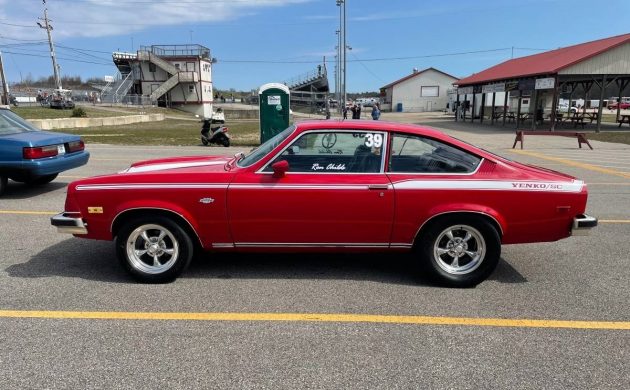
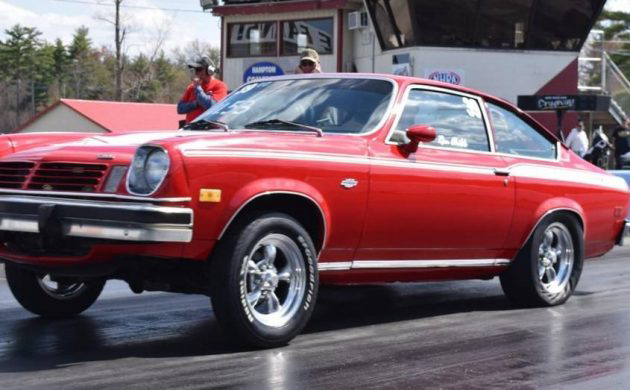
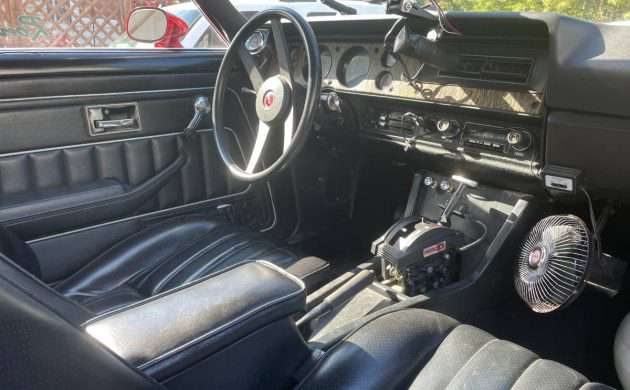
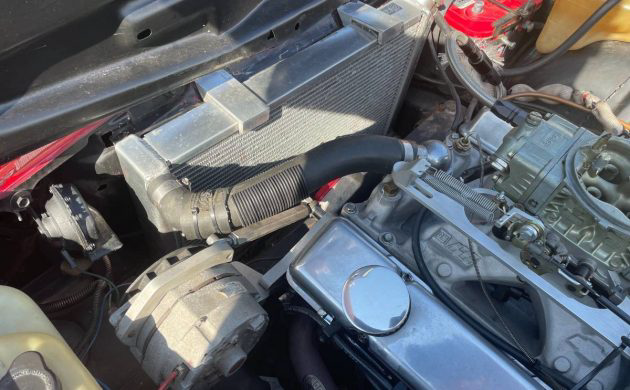
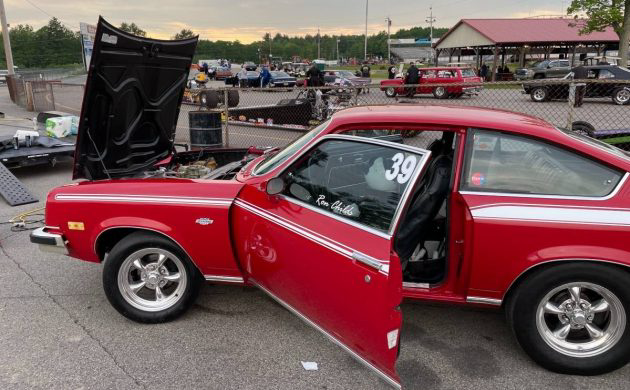



Everything about this car works! The color, stance, graphics, and the performance. I’m sure it’s a blast to drive. I would be on the street hunting unsuspecting Tesla’s if I owned this.
This is a nice but different addition to what Chevy was offering in the early to late 70s. I had a friend that had a ’74 Pontiac Astre. We had fun hijacking it from his parents to cruise around Ontario in the early 80’s. But the best memory I have is how my friend and I got to own a custom ’73 Vega. Big deal right? Well this one had a small block 350 wedged in tight. It had all the bells and whistles of a street sleeper. Only one problem. First time out and way too heavy on the gas the Vega turned out to be the first custom GM pretzel. So bad that it had to be flatbedded back to its home. So for sale it went. We got it for $300.00 cdn. Did some magic and hard labour and got it barely street safe to have some sort of fun in it. All I’m saying is that those that decide to make these crappy 4’s into scrappy 8’s remember that the frame needs alot, and I mean alot of love if you want it to last longer than 4 secs. K? Love you all!! Bye!
Beautiful Vega. It has Yenko decals, I wonder if that is a true Yenko? Either way I would have this car on the street on nice days and entered in shows!
Yenko Stinger Vegas were made in 1971 and 1972, so no, this is just a Tribute. Very nice car though, not many survived this nice.
Because it’s not the wagon model I was on the fence then I saw the hillbilly AC mounted next to the shifter ….. I’m sooo all-in!!!!
I think they should have done a nicer job
of integrating the shifter setup.
My kind of car. Done just right for what it was built for.
Awesome car! I’m surprised there is no roll cage or bar for a strip car.
Yes super cool, but for that money i would like to have something else.
Unusual and nice! Good luck with the sale!
Give me a year with the Mustang II. NICE BUT NO BOWTIE FOR ME
Why would you even mention a Mustang II in this write up? There is no such thing as a quick Mustang II.
Dyno Don Nicholson had one
Little known fact that Vega bodies were made from compressed rust. The aluminum engine could not withstand overheating, so GM, in their infinate wisdom, installed a small radiator when there was space for one 50% larger.
The unibody was so flimsy, that if the car was jacked up with a door open, it would not close due to chassis flex. Build quality at the Lordstown Ohio was terrible. In spite than that, they managed to unload 2,000,000 of these turds to unsuspecting buyers.
I like the poor man’s air conditioning, tho maybe a vintage air a/c compressor & a V8 won’t both fit under the hood?
I just can’t imagine the gigantic heavy harrison a/c compressor in the early vegas mounted on its weak 4 cylinder motor.
the fan is to give the driver any cooling he can get as you wait in line for your turn down the strip. many of the cars that see a lot of strip duty install these. can get pretty hot surrounded by all the other cars waiting their turn, especially when you consider wearing a helmet and any other required safety gear.
Russ Dixon:
“they sometimes didn’t work quite as expected. Like the air-cooled, rear-engine compact Corvair that attracted later concerns over safety issues.” The safety concerns were all in Nader’s head, and nowhere else. He did a job on the Corvair, which,thankfully, extended Corvair production by a few more years. The LM Corvair did work as expected: with the revised suspension, it handled as if on rails, as I found out when I had to do an emergency 125 mile medical run on an unfamiliar secondary highway, at high speed, in an unfamiliar Corvair coupe, a 110 with AT. Having had a few years of sedan racing, it impressed me to the point that I wished I’d competed in one.
Can we now, finally, put this old saw of “Nader killed the Corvair” out to rest?
I have to step up: the kids car’s motor seized. The only request from my other was it had to be new, too many old cars, hers was the only reliable car available during the day. Dad found a stripped burgundy Pinto, with a 3 speed. I found a silver Vega with a 4spd, white wall tires and wheel trim rings. I convinced to buy the “well equipped” Vega. Eight New England winters, it never rusted or broke down. Bitter winters on the Canadian border and it chugged right along. Oh, yea, we did get the motor rebuilt for free from Chevy, in year 3, due to its oil consumption. It wasn’t horrific, but we took advantage of it. Frankly, it was a great little car. After 9 years we sold it for 30% of what we paid for it ! Not a bad little car of the time.